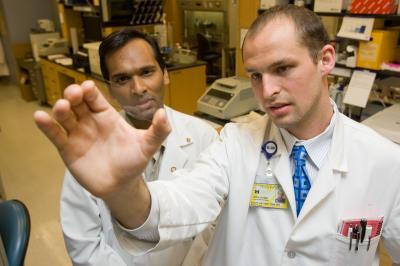摘要:一项新的研究报告说,一种新的尿液检测可区分具有不同前列腺癌风险的男性。对那些已经在检测中发现有高血清浓度的前列腺特异性抗原(或称PSA)的男子来说,这些发现提供了一种指示是否需要进行活检的新工具。由Scott Tomlins及其同事研发的这一尿液检测应用一种前列腺癌特异性的基因改变来发现癌症:一种2个基因--TMPRSS2 与 ERG--的“融合”。 以往的研究工作显示,TMPRSS2-ETS 基因融合存在于50%的PSA-筛检过的罹患前列腺癌的男子中。研究人员在此显示,具有TMPRSS2-ERG高表达水平加上前列腺特异性抗原-3或称PCA3的男性可能会罹患前列腺癌。这标志了前列腺癌检测技术的一个改进,因为目前的做法仅仅是检测血清中的PSA是否增加。不幸的是,血清PSA会在许多非癌症的情况下增高,从而导致误诊及不比要的活检。据说,美国每年有超过一百万男子会做前列腺活检,其中大多数是因为其血清PSA浓度有所增加。Tomlins及其同事发现,在那些已知血清PSA浓度增加的男性中,在活检之前进行TMPRSS2-ETS+ PC3尿液筛检可显著地改善对癌症的预测。 研究人员用这种新的尿液检测来筛检了1000多名男子,并根据筛检结果将这些男子分成具有不同癌症风险的部类:最低风险、中度风险及最高风险等种类。随后的在最低风险、中度风险和最高风险组中进行的活检所得到的癌症诊断率分别为21%、43%和69%。该研究证明了此尿液检测可作为探查具有产生前列腺癌高风险的男性的一种精确的、“个体化”的工具的可行性。
生物探索推荐英文论文摘要:
Urine TMPRSS2:ERG Fusion Transcript Stratifies Prostate Cancer Risk in Men with Elevated Serum PSA
ABSTRACT
More than 1,000,000 men undergo prostate biopsy each year in the United States, most for “elevated” serum prostate-specific antigen (PSA). Given the lack of specificity and unclear mortality benefit of PSA testing, methods to individualize management of elevated PSA are needed. Greater than 50% of PSA-screened prostate cancers harbor fusions between the transmembrane protease, serine 2 (TMPRSS2) and v-ets erythroblastosis virus E26 oncogene homolog (avian) (ERG) genes. Here, we report a clinical-grade, transcription-mediated amplification assay to risk stratify and detect prostate cancer noninvasively in urine. The TMPRSS2:ERG fusion transcript was quantitatively measured in prospectively collected whole urine from 1312 men at multiple centers. Urine TMPRSS2:ERG was associated with indicators of clinically significant cancer at biopsy and prostatectomy, including tumor size, high Gleason score at prostatectomy, and upgrading of Gleason grade at prostatectomy. TMPRSS2:ERG, in combination with urine prostate cancer antigen 3 (PCA3), improved the performance of the multivariate Prostate Cancer Prevention Trial risk calculator in predicting cancer on biopsy. In the biopsy cohorts, men in the highest and lowest of three TMPRSS2:ERG+PCA3 score groups had markedly different rates of cancer, clinically significant cancer by Epstein criteria, and high-grade cancer on biopsy. Our results demonstrate that urine TMPRSS2:ERG, in combination with urine PCA3, enhances the utility of serum PSA for predicting prostate cancer risk and clinically relevant cancer on biopsy.

This is Scott Tomlins, M.D., Ph.D., and Arul Chinnaiyan, M.D., Ph.D.
生物探索推荐英文原文报道:
New Urine Test Shows Prostate Cancer Risk; Test for Gene Fusion Can Assist in the Early Detection of Prostate Cancer
A new urine test can help aid early detection of and treatment decisions about prostate cancer, a study from the University of Michigan Comprehensive Cancer Center and the Michigan Center for Translational Pathology finds.
The test supplements an elevated prostate specific antigen, or PSA, screening result, and could help some men delay or avoid a needle biopsy while pointing out men at highest risk for clinically significant prostate cancer.
The test looks for a genetic anomaly that occurs in about half of all prostate cancers, an instance of two genes changing places and fusing together. This gene fusion, TMPRSS2:ERG, is believed to cause prostate cancer. Studies in prostate tissues show that the gene fusion almost always indicates cancer. But because the gene fusion is present only half the time, the researchers also included another marker, PCA3. The combination was more predictive of cancer than either marker alone.
Results of the study appear Aug. 3 in Science Translational Medicine.
"Testing for TMPRSS2:ERG and PCA3 significantly improves the ability to predict whether a man has prostate cancer," says lead author Scott Tomlins, M.D., Ph.D., a pathology resident at the U-M Health System. "We think this is going to be a tool to help men with elevated PSA decide if they need a biopsy or if they can delay having a biopsy and follow their PSA and urine TMPRSS2:ERG and PCA3."
The researchers looked at urine samples from 1,312 men at three academic medical centers and seven community-based hospitals. The men all had elevated PSA levels and had gone on to receive either a biopsy or prostatectomy, surgery to remove their prostates. The researchers evaluated the urine samples for TMPRSS2:ERG and PCA3 and stratified patients into low, intermediate and high scores, indicating their risk of cancer. They then compared this to biopsy results.
Biopsies indicated cancer in 21 percent of men from the low-score group, 43 percent in the intermediate group and 69 percent in the high group. Further, the urine test scores correlated with how aggressive the cancer was, based on tumor size and Gleason score, a measure of how abnormal the cells look. Only 7 percent of men in the low-score group had an aggressive tumor while 40 percent of those in the high-score group did.
"Many more men have elevated PSA than actually have cancer but it can be difficult to determine this without biopsy. This test will help in this regard. The hope is that this test could be an intermediate step before getting a biopsy," says senior study author Arul Chinnaiyan, M.D., Ph.D., director of the Michigan Center for Translational Pathology and S.P. Hicks Professor of Pathology at the U-M Medical School. Chinnaiyan is also a Howard Hughes Medical Institute researcher.
Prostate biopsies are done with a needle in an office setting, but they do pose some discomfort and risk to the patient. In addition, a biopsy can offer an incomplete picture since urologists are testing the prostate as a whole, rather than a specific lesion.
The combined TMPRSS2:ERG and PCA3 test is not yet available as a prostate cancer screening tool. The Michigan Center for Translational Pathology is working with Gen-Probe Inc., which has licensed the technology, and hopes to offer it to U-M patients within the year. U-M currently offers PCA3 screening alone as follow-up to elevated PSA. Men with questions about prostate cancer screening should speak to their doctors or call the U-M Cancer AnswerLine at 800-865-1125.
Prostate cancer statistics: 217,730 Americans will be diagnosed with prostate cancer this year and 32,050 will die from the disease, according to the American Cancer Society.
Additional authors: From U-M: Javed Siddiqui, Robert J. Lonigro, Laurie Sefton-Miller, Radhika Varambally, Bo Han, David Wood, Lei Wang, Daniel Rhodes, Brent Hollenbeck, Stephanie Meyers, Nallasivam Palanisamy, John T. Wei; from Gen-Probe: Sheila M.J. Aubin, Siobhan Miick, Sarah Williamsen, Petrea Hodge, Jessica Meinke, Amy Blase, Yvonne Penabella, John R. Day, Harry Rittenhouse, Jack Groskopf; from Harvard Medical School: Martin G. Sanda; from Weill Cornell Medical College: Mark A. Rubin; from University of California San Diego Medical Center: Kyoko Sakamoto, Jonathan L. Silberstein; from Universite Laval, Quebec: Yves Fradet; from Dianon Systems Inc.: James B. Amberson.
Funding: Gen-Probe Inc., the Early Detection Research Network, National Institutes of Health, Prostate Cancer Foundation, Burroughs Wellcome Fund, Doris Duke Foundation, Howard Hughes Medical Institute.







